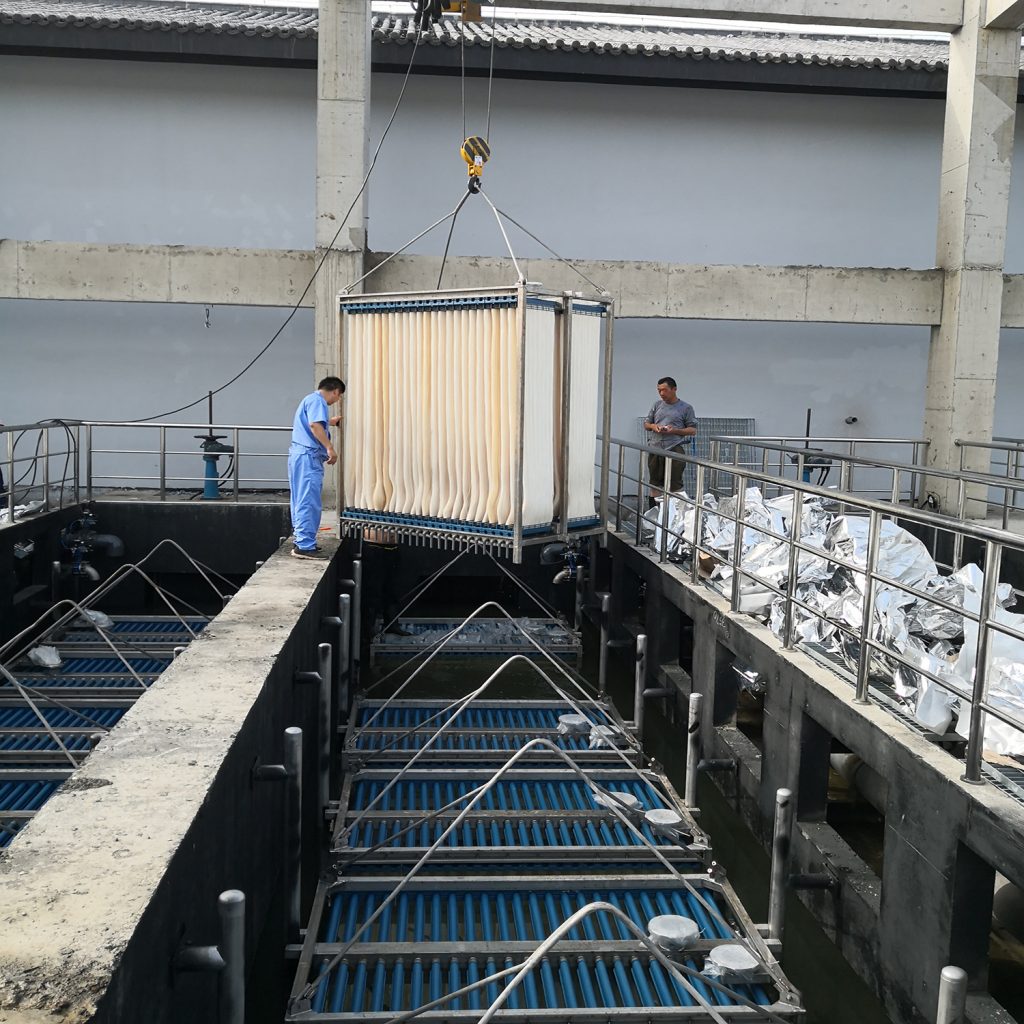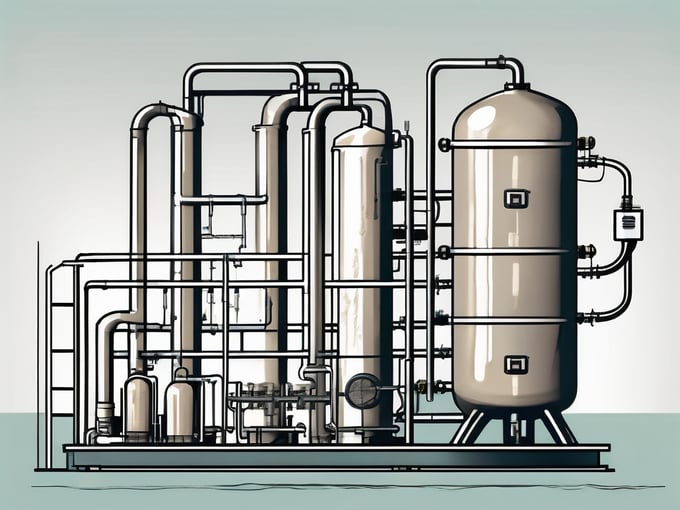How to Optimize Membrane Bioreactor Performance for Maximum Efficiency
Wiki Article
The Benefits of Membrane Layer Bioreactors in Sustainable Wastewater Management
Membrane layer bioreactors (MBRs) represent a crucial innovation in sustainable wastewater management, successfully merging organic treatment with innovative membrane purification modern technology. This combination not just improves effluent top quality by effectively removing pollutants yet likewise opens up avenues for water reuse in numerous applications, thus addressing the pressing demand for resource conservation. The portable design of MBRs contributes to considerable reductions in ecological impact and operational expenses. As the need for sustainable options increases, discovering the diverse benefits of MBRs may reveal unforeseen effects for the future of wastewater treatment systems.Overview of Membrane Bioreactors
Membrane layer bioreactors (MBRs) stand for a significant improvement in wastewater therapy innovation, integrating organic destruction with membrane layer filtering to improve the performance of the therapy process. This innovative system combines the benefits of conventional turned on sludge procedures with membrane layer innovation, enabling boosted solid-liquid splitting up. MBRs use semi-permeable membranes to separate cured water from biomass, leading to high-grade effluent that can be reused or securely released right into the setting.The operational style of MBRs generally involves a bioreactor where bacteria damage down raw material, adhered to by a membrane layer device that filterings system the blended liquor. This setup not just reduces the footprint of the therapy facility but also enables for greater biomass focus and decreased hydraulic retention times. MBRs are qualified of dealing with a bigger variety of pollutants, consisting of virus and nutrients, making them appropriate for different applications, from metropolitan wastewater therapy to commercial effluent handling.
The assimilation of MBRs into wastewater administration systems is a measure of a growing pattern towards sustainable and efficient methods in environmental design. Their capacity to produce high-quality effluent while decreasing space demands placements MBR modern technology as a key player in modern wastewater therapy options.
Enhanced Effluent Quality

The membrane filtration process serves as a physical obstacle, enabling the retention of bacteria and particle matter, which adds to a clearer and cleaner effluent (Membrane Bioreactor). Additionally, MBRs run at higher biomass focus than conventional turned on sludge systems, promoting much more reliable biodegradation of toxins. This leads to a reduction in biochemical oxygen demand (BODY) and overall suspended solids (TSS) degrees in the last effluent
In addition, MBRs show exceptional efficiency in treating tough wastewater compositions, such as industrial effluents and wastewater with high nutrient loads. Because of this, the effluent generated is commonly of better, permitting even more flexible disposal options and decreased ecological effect. Inevitably, the boosted effluent top quality achieved with MBR modern technology highlights its crucial duty in progressing lasting wastewater administration practices.
Water Reuse Opportunities
The top quality effluent generated by membrane layer bioreactors (MBRs) opens considerable possibilities for water reuse in numerous applications. MBRs successfully eliminate pollutants, consisting of virus, put on hold solids, and organic issue, leading to cured water that meets or exceeds regulative requirements for reuse. This quality enables for the application of water recycling initiatives across diverse fields.One prominent application is in farming, where dealt with wastewater can be used for irrigation, advertising sustainable farming practices while conserving fresh water sources. Additionally, MBR-treated effluent can be used for industrial procedures such as air her response conditioning, cleansing, and as a process water source, significantly decreasing the demand for safe and clean water in these procedures.
In city atmospheres, MBRs help with more info here the usage of redeemed water for landscape watering, bathroom flushing, and various other non-potable uses, adding to the overall strength of water system systems. The integration of MBR innovation in decentralized systems aids in handling local water demands, particularly in water-scarce regions.
Decreased Ecological Influence
Just how can the fostering of membrane layer bioreactors (MBRs) add to a reduced environmental influence in wastewater monitoring? MBRs significantly boost the therapy performance of wastewater while minimizing environmental disturbances. By incorporating biological therapy processes with membrane layer filtering, MBRs properly remove a wide variety of pollutants, consisting of organic matter, nutrients, and microorganisms. This innovative filtration results in higher-quality effluent, which is essential for shielding aquatic environments and decreasing the concern on natural water bodies.Moreover, MBRs operate at reduced hydraulic retention times compared to traditional systems, leading to smaller therapy plant impacts. This small style decreases land use, consequently protecting natural habitats and biodiversity. The procedure likewise produces less sludge than conventional methods, mitigating disposal challenges and decreasing greenhouse gas emissions linked with sludge monitoring.
Furthermore, MBRs facilitate the recuperation of beneficial resources, such as water and nutrients, adding to a circular economic climate. By enabling water reuse for watering or industrial procedures, MBRs help reduce freshwater deficiency, therefore promoting lasting water make use of methods. Ultimately, the fostering of MBR innovation represents a significant stride in the direction of reducing the basics ecological effect of wastewater administration systems.
Economic Benefits of MBRs

Furthermore, MBRs promote the production of top quality effluent, which can be reused for numerous applications, such as farming watering and commercial procedures - Membrane Bioreactor. This reuse ability can dramatically decrease water purchase expenses, giving a monetary motivation for sectors dealing with rigorous water guidelines
The compact style of MBR systems additionally causes minimized land demands, which is particularly important in urban locations where property is costly. By lessening area, markets and communities can save money on land procurement and upkeep costs.
In addition, MBRs usually need less frequent upkeep and have a longer life expectancy than traditional systems, better adding to set you back financial savings. In summary, the financial advantages of MBRs-- varying from lowered operational costs to land cost savings and effluent reuse-- make them an engaging option for sustainable wastewater administration, using both long-term and instant economic advantages.
Final Thought
Membrane bioreactors represent a transformative strategy to lasting wastewater monitoring, incorporating biological therapy with sophisticated membrane layer filtering for remarkable effluent top quality. Their ability for reliable pollutant elimination assists in water reuse, thus preserving crucial freshwater sources. Additionally, MBRs add to minimized ecological impacts through compact layouts and lower sludge generation. Economic advantages better boost their practicality, making MBRs an encouraging remedy for addressing the obstacles of wastewater treatment and advertising lasting source monitoring.
Membrane layer bioreactors (MBRs) represent a critical improvement in sustainable wastewater administration, successfully combining organic therapy with innovative membrane layer filtering innovation.Membrane layer bioreactors (MBRs) represent a considerable development in wastewater treatment technology, integrating biological degradation with membrane layer filtering to boost the efficiency of the therapy procedure.Accomplishing improved effluent high quality is one of the most significant benefits of utilizing membrane layer bioreactors (MBRs) in wastewater treatment.Furthermore, MBRs show outstanding performance in treating difficult wastewater compositions, such as commercial effluents and wastewater with high nutrient tons.Integrating membrane layer bioreactors (MBRs) into wastewater management not only reduces environmental effect but also presents substantial economic benefits.
Report this wiki page